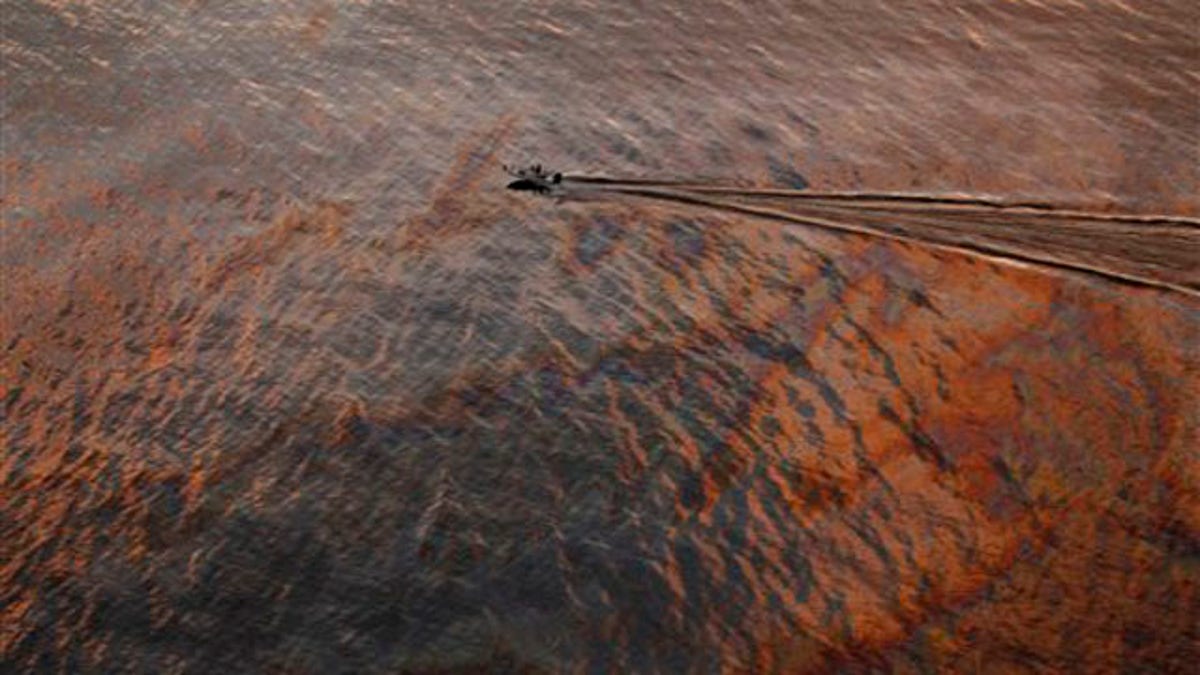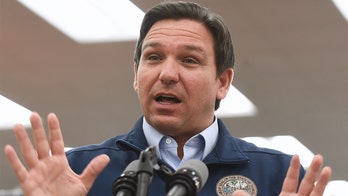
In this July 31 file photo, a boat motors through an oil sheen from the Deepwater Horizon oil spill off the Louisiana coast. (AP)
It took U.S. and British teams three months to cap the well in the BP oil spill. A Florida lawmaker doesn't want to find out how long it would take Cuba to cap a similar catastrophe.
Rep. Vern Buchanan, a Republican who represents part of Florida's western coast, has introduced a bill aimed at blocking Cuba from drilling a new deepwater oil well in the waters off its northern coast.
Citing threats to his state's tourism industry and environment in the event of a potential oil spill, Buchanan has expressed concern that the communist country -- and the Spanish company it has contracted for running the Chinese-built rig -- would be incapable of handling the kind of disaster spill that strained U.S. response teams last spring.
The proposal would treat Cuba's drilling industry kind of like Iran's sanctioned energy sector. It would empower the U.S. interior secretary to deny an oil-and-gas lease, or exploration permit, to any company dealing with a country under U.S. sanction or embargo.
Though vague, the language is directed at Spanish oil-and-gas firm Repsol, which is heading up Cuba's new oil plans. The issue troubling Buchanan is that Cuba is looking to drill for oil even deeper than BP's Deepwater Horizon rig, which exploded last April and sent millions of barrels of oil into the Gulf. Not only would Cuba's well be deeper -- at 5,600 feet compared to 5,000 feet -- but Buchanan said it would be at the edge of Cuba's territorial waters, 50 miles from the Florida coast.
"As we have learned from the Deepwater Horizon disaster in the Gulf of Mexico, an oil spill can devastate a regional economy and impose serious long-term environment damage to precious natural resources," he said in a written statement.
In the event of a spill, he said, "quickly capping the well would be extremely difficult, if not impossible." Buchanan said the hypothetical oil slick would take "just three days" to reach Florida's beaches, which drives its tourism economy.
Buchanan spokesman Max Goodman called the bill "very time sensitive," with drilling slated to begin within a year.
His office suggested Cuba's government could not be counted on to clean up another mega-spill.
Asked whether Repsol would be able to step in, Repsol representative Kristian Rix told FoxNews.com the company "adheres to the strictest safety measures" and develops "comprehensive accident response plans" in every country where it does business.
"We have every confidence that our teams and equipment are well prepared to carry out operations safely and effectively," Rix, the firm's international and financial media manager, said in an e-mail.
A Spanish court began an investigation last year into a spill at one of Repsol's Mediterranean rigs, though that leak was not anywhere near as colossal as the BP spill.
For the new rig, the United States could not directly block Cuba from drilling in its own waters. But under Buchanan's bill the U.S. could threaten Repsol's projects elsewhere in U.S. territory. The company operates rigs near Texas and Louisiana. With his bill, Buchanan wants to compel Repsol to abandon the Cuba drilling to protect its other assets.
The company earlier backed off a natural gas project in Iran after facing pressure from the United States over Iran's nuclear program.
Buchanan's not the only prominent Floridian to warn about the danger of new international drilling near the Sunshine State's shores. Former Sen. Bob Graham warned in a speech Jan. 14 that Cuba is planning other drilling projects with a Russian firm. According to an account of the speech in The Miami Herald, Graham said the United States should partner with Mexico to draft new international drilling safety standards in the Gulf. In addition, he said, Mexico should press Cuba to impose such standards. Graham said the BP spill should be a "wake-up call."
The BP spill dumped an estimated 4.9 million barrels of oil into the Gulf, hammering the coastline and offshore waters as well as the region's fishing and tourism economies. Florida's $60 billion-a-year tourism industry stood to suffer the most. A report put out last summer by the U.S. Travel Association said Florida's losses over the next three years could amount to nearly $19 billion.
Buchanan last expressed concerns about the Cuba project in a letter to President Obama in October. His bill has so far attracted just two co-sponsors -- both Florida Republicans -- but Goodman said the congressman is seeking bipartisan support.
The Interior Department had no comment when asked Monday whether Secretary Ken Salazar was interested in attaining or exercising the authority Buchanan wants to give him.




